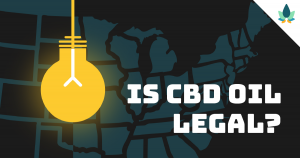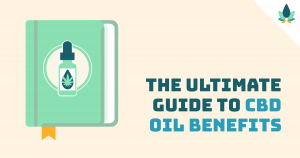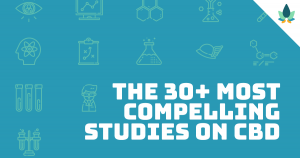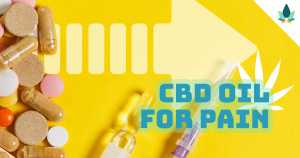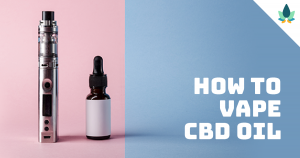Cancer is a leading cause of death worldwide.
This year alone over 1.7 million individuals will be diagnosed with cancer in the United States, and over 600,000 will die from the disease. It might – on the surface – seem unlikely that something as natural and “non-potent” as CBD could help treat cancer symptoms and even inhibit tumor growth. But, that might not be the case. (1)
The number above is not limited to adults. 15,000 children under the age of 19 will be diagnosed this year, with over 1,700 passing away due to the disease and its effects. These numbers are large. They’re terrifying.

Put in even more stark terms, around 38% of adults face the risk of a cancer diagnosis at some point in their lifetimes. That’s nearly half.
While standard treatments that have been around for decades are often effective at treating certain aspects of the disease, research has recently shifted toward the promise of using CBD to treat some of the more prevalent forms of cancer and their side effects, including anxiety, tumors, pain, appetite problems and more.
Most Prevalent Cancers Today
- Breast cancer
- Lung cancer
- Prostate cancer
- Colon and rectum cancer
- Melanoma
- Bladder cancer
The Effects of Cancer
While each cancer has its own side effects and treatment plans, the devastating effects, both visible and invisible, can be financially devastating, hard for loved ones and the patients themselves, and – at times, as the statistics above illustrate – deadly.
These symptoms and side effects could include:
- Mood changes
- Appetite decreasing and/or otherwise changing
- Fatigue
- Loss of coordination/balance/falling
- Higher prevalence of infection
- Neuropathy
- Seizures
- Weakness
- And so many more. (2)
The Effects of Cancer Treatments
Because CBD has proven effective at treating many of these symptoms apart from cancer, it would make sense that it could be included in treatment plans to help counter them, right?
Instead, as a first line of attack, many cancer patients are subjected to drug trials, chemotherapy, radiation, and other powerful procedures and drugs that effectively poison the cancer cells within the body. While this often – with varying schedules of treatments, amounts of time, and other variables – does treat the cancer and its symptoms, it often causes numerous side effects, in addition to those associated with the disease itself.
These often include:
- Swelling
- Persistent and extreme nausea
- Unrelenting fatigue
- Hair loss
- Swelling
- Fevers
- Mouth sores
- And more.
Many of these are due to the fact that these treatments, while targeting cancer cells, often target hair follicles, cells in the digestive tract, and blood-forming cells in the bone marrow of patients. (3)
Combined, the treatments and the disease itself can wrack more havoc on the body than any other disease is known to cause. Because the effects are so visible and the disease is so common, a sense of dread if you or a loved one is facing a battle with cancer is understandable.
Why CBD Shows Promise in Treating Cancer and Its Effects
Because the effects of cancer are so broad, CBD may be able to counteract certain side effects and symptoms, in addition to traditional medicine, as it has not been proven to replace these treatments as of yet.
But, the compound absolutely shows promise in multiple areas that include: appetite augmentation/nausea reduction, anxiety regulation, and even shrinking tumors themselves.
CBD FOR APPETITE ENHANCEMENT
Our bodies need food to function and, most importantly, to heal. Unfortunately, between nausea and a complete lack of appetite, this can be difficult for cancer patients, especially those undergoing chemotherapy, to manage.
Often, receptors in the brain and digestive system bind to serotonin. When too much is released, nausea is a natural effect.
CBD works like many anti-emetics by effecting the same receptors through its interaction with the endocannabinoid system, blocking the release of serotonin, and minimizing the effects of nausea in some patients.
This effect could be valuable for those who must retain nutrients and stamina during intense rounds of cancer treatment.
CBD FOR ANXIETY REGULATION
Anxiety is a common side effect associated with cancer and its treatment. From a dread of upcoming surgeries, continual treatments that are challenging – to put it lightly – to the unknowns associated with the disease, it seems natural that anxiety may become problematic.
To avoid treatment and additional side effects from traditional anxiety medication in addition to cancer treatments, patients may be able to attempt to minimize anxiety with CBD.
The compound interacts with multiple receptors in the brain and nervous system, linked to fear and behaviors/emotions induced by anxiety, including serotonin receptors (like those linked to nausea) and cannabinoid type 1 receptors. (4)
By interacting with these receptors to inhibit different neurotransmitters, it has shown early promise in regulating mood and mental functioning in both generalized anxiety patients, and those with anxiety stemming from conditions like cancer.
CBD AND PAIN
One of the most common side effects of cancer is pain. Its location and severity depends on the location of the cancer, the treatments involved and its progression, but, 75 percent of cancer patients require opioids for the management of pain relating to the disease. (5)
This is yet another area of promise, as CBD is proven to provide pain relief by targeting the a3 glycine receptors, reducing a sufferer’s sensation of pain.
For patients looking to avoid the side effects and potential withdrawal symptoms associated with the addictive nature of opioids and other traditional pain-relieving drugs, CBD might be an excellent place to start.
CBD’S TUMOR SHRINKING POTENTIAL
One of the most exciting potential developments in the study of CBD is its ability to actually shrink tumors and prevent the spread of cancer cells throughout the body of patients, as highlighted by a review posted to the British Journal of Clinical Pharmacology. (6)
In one study, outlined by this review, CBD at a potency of 70% was shown to cause cell death among breast cancer cells by inducing mitochondria-mediated apoptosis.
Another study highlighted in a different British Journal of Clinical Pharmacology review found that CBD may be able to inhibit tumor growth, supporting its potential role as a cancer-fighting compound. (7)
In fact, in numerous studies, CBD has shown promise in reducing malignancy, preventing the spread of cancer, reducing tumor size and more in multiple forms of cancer, including bladder cancer, brain cancer, breast cancer, lung cancer, endocrine cancer, leukemia and more. (8, 9, 10, 11, 12, 13)
With few side effects and no harmful side effects, CBD may be worth discussing with your or your loved one’s medical provider prior to or during cancer treatments following an official diagnosis. (14)


